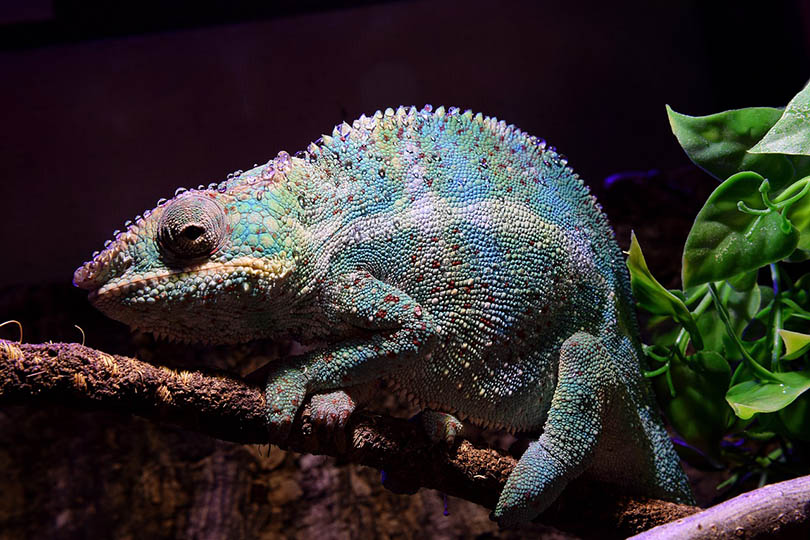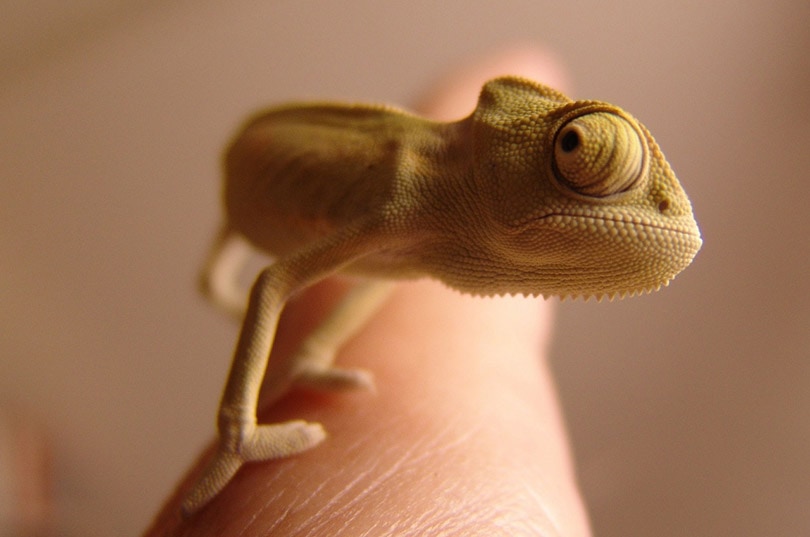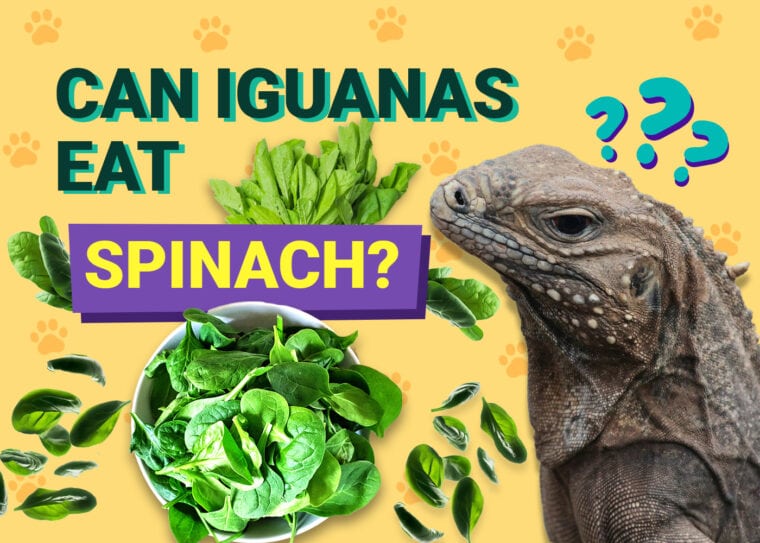
Iguanas are popular in the pet trade and do well with proper care and attention to their needs. Unfortunately, some owners feed their iguanas the wrong diet, leading to health problems or premature death.
We know spinach is healthy for humans, but can iguanas eat spinach? Yes, they can enjoy this leafy green in small portions, but there are some things to keep in mind before you offer up this snack to your reptile. Let’s take a closer look.
Spinach for Iguanas
Spinach is high in many vital nutrients for both humans and iguanas, such as protein, fiber, calcium, iron, and vitamins K, C, A, and B9. Spinach also has no fat or sugar, which is good for iguanas.
There is one concern with spinach, however – oxalate. Also known as oxalic acid, oxalate is an organic compound that binds to calcium minerals and prevents absorption. Iguanas, like other lizards, need a lot of calcium to support bone health. Oxalate also forms calcium oxalate when it binds with calcium, which can lead to kidney blockage, necrosis, and eventual death.
This doesn’t mean you can never feed spinach to your iguana. It just means that you should feed spinach and other vegetables with high oxalate in small portions.
Spinach should be fed raw, but if you’re concerned about oxalate, you can boil or steam the spinach to reduce the oxalic acid content. However, sauteed or creamed spinach should never be fed to your iguana, and you shouldn’t add any seasonings or spices.
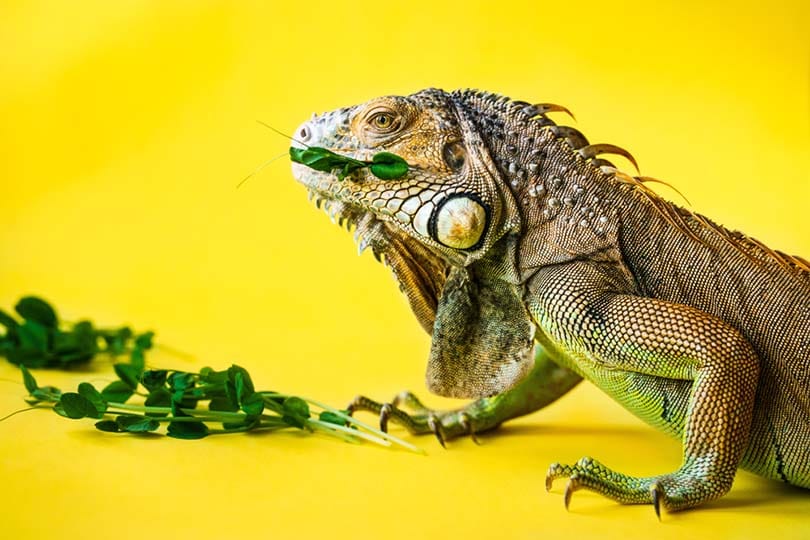
The Ideal Iguana Diet
Iguanas are herbivorous animals, meaning that they eat plants in their wild diets. Specifically, iguanas are folivores, so they eat mostly leaves and vines and flowers or fruit on occasion. Many of these foods are high in fiber, but iguanas are hindgut fermenters with specialized organisms to digest these foods.
Most of an iguana’s diet should be dark green, leafy vegetables, supplemented with small amounts of yellow, red, or orange vegetables and fruit. Light green vegetables, such as lettuce and celery, should be avoided as they have little nutrient content.
Some of the best vegetables for iguanas include calcium-rich greens, such as beet greens, turnip greens, mustard greens, spinach, alfalfa, bok choy, collard greens, Swiss chard, romaine lettuce, escarole, and dandelion greens. They should be roughly 40 to 50 percent of the adult iguana’s diet. For the other 30 to 40 percent, you can include cactus, squash, bell peppers, sweet potato, broccoli, carrots, peas, and corn.
Swiss chard, spinach, and beet greens are excellent nutrient sources, but they should not be fed alone. These plants contain oxalates, which can bind to calcium and trace minerals and prevent their absorption. Some green vegetables contain goitrogens as well, which are chemicals that can cause hypothyroidism and goiter, and should be limited.
Fruits can be about 20 percent of the total diet. You may include apples, bananas, pears, mangoes, peaches, tomatoes, melons, apricots, dates, blueberries, raspberries, and strawberries. Edible flowers, such as dandelions, carnations, roses, and geraniums, may be given in small portions.
All foods should be given raw but need to be washed thoroughly to remove debris and pesticides. If possible, select organic produce.
Can Iguanas Have Animal Protein?
Most of the common foods given to lizards contain too much protein for an iguana, such as crickets, tofu, hard-boiled egg, pinky mice and rats, and mealworms. If you choose to feed some animal protein, be sure to keep it at 5 percent or less of the total diet.
Young iguanas can handle a little more protein, about 10 percent of the total diet. Avoid giving your iguana any dog or cat food, which contains too much fat and protein.
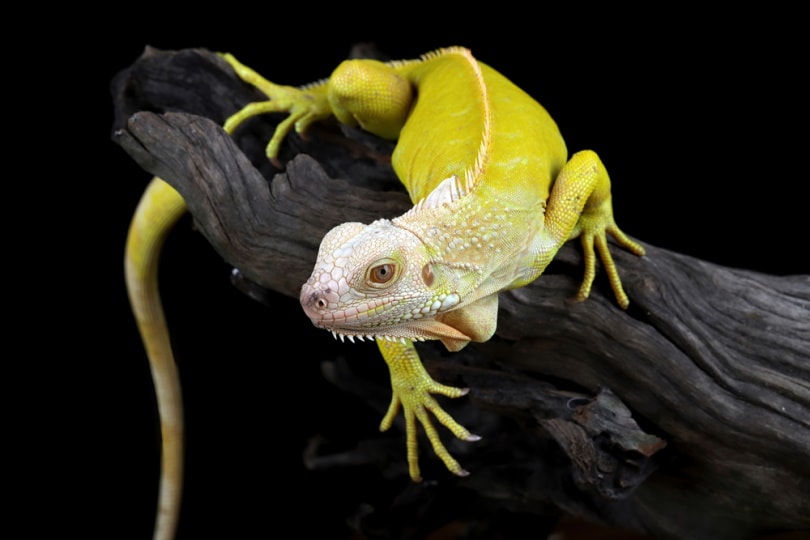
Should Iguanas Have Vitamin and Mineral Supplements?
Iguanas need dietary calcium, so many veterinarians recommend sprinkling a growing iguana’s food with calcium powder designed for reptiles. This should be without added vitamin D and phosphorus.
There’s also debate about whether iguanas can absorb vitamin D from food or only from UV light sources. Iguanas should have a UV light source to get their vitamin D needs, but you may also supplement with vitamin D twice a week.
Ask your veterinarian about your iguana’s diet and supplement needs, based on its age, history, and current nutrition.
How Much Water Should an Iguana Have?
Your iguana will get plenty of water from its diet, but it should still have access to fresh, clean water at all times. Iguanas will drink from the water bowl and bathe in it to absorb water through their skin. Be sure to choose a heavy bowl that’s difficult to knock over and change the water frequently to remove waste.
Iguanas live in hot, humid environments, such as the rainforest, so they require temperatures of 95 to 100 degrees Fahrenheit in the basking area and 80 to 85 degrees Fahrenheit ambient. High heat can dry out a terrarium quickly, especially in dry climates, so large water bowls and regular misting can keep your iguana at the ideal humidity of 70 percent. Prolonged, low humidity can lead to shedding and kidney problems.
Conclusion
Though some of the recommendations for captive iguana care vary, spinach is a nutritious vegetable that is safe for your iguana in small portions. If you’re concerned about the oxalic acid content, boil or steam the spinach before feeding. Be sure to consult with your veterinarian about your iguana’s specific nutritional needs.
- You may also want to read: Can Iguanas Eat Celery? What You Need to Know!



